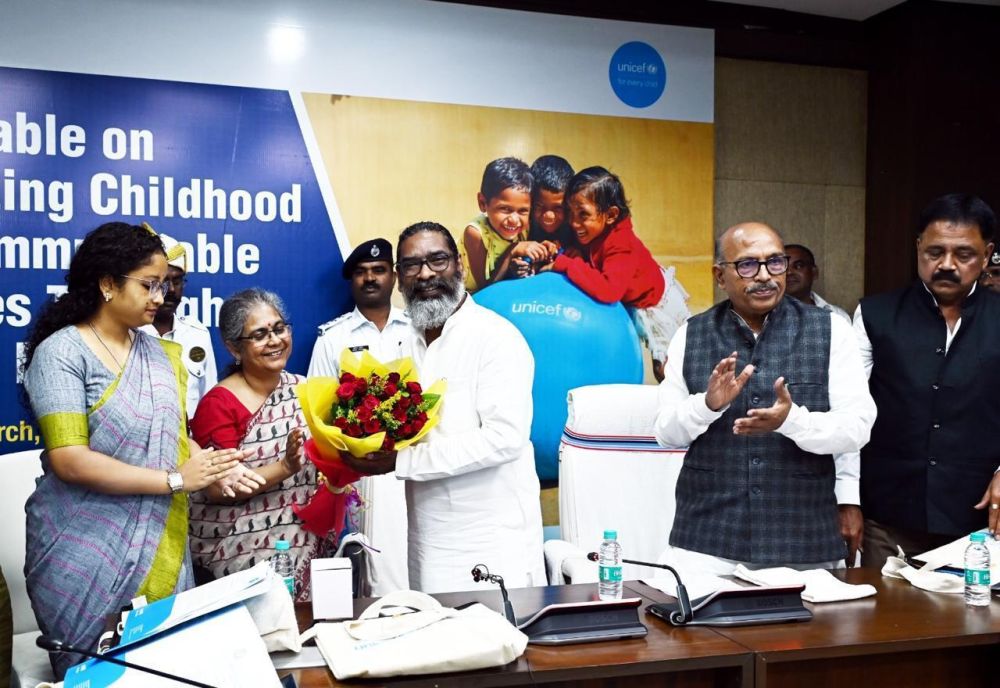
UNICEF Jharkhand, in collaboration with the Jharkhand Legislative Assembly, organized a roundtable discussion under the chairmanship of Speaker of the Legislative Assembly, Shri Rabindranath Mahato.
The topic was “Preventing Childhood Non-Communicable Diseases through Healthy Diets”. It was held in the presence of the Chief Minister, Shri Hemant Soren, Shri Sudivya Kumar Sonu, Hon'ble Minister of Tourism, Art, Culture, Sports, and Youth Affairs; Shri Yogendra Prasad, Minister, Drinking Water, Sanitation and Excise dept; Smt. Kalpana Soren, Member of the Legislative Assembly, along with 43 other MLAs at New Jharkhand Vidhan Sabha today.
The workshop aimed at raising awareness about the growing burden of non-communicable diseases (NCDs) among children and youth and how to prevent them through healthy diets.
The discussion brought together Jharkhand’s legislators and health experts to address the rising burden of childhood NCDs such as obesity, sickle cell anaemia, childhood diabetes, hypertension, and malnutrition, primarily caused by unhealthy diets, insufficient physical activity, and limited nutritional awareness.
The Hon’ble Chief Minister, Shri Hemant Soren, emphasized the need for focused intervention to eradicate non-communicable diseases such as sickle cell anemia, type 1 diabetes, and cervical cancer.
He said, “To achieve this, a household-level state health profile is necessary, which will help us understand the prevalence of area-specific issues and enable us to design targeted interventions.” He stated that with UNICEF's expertise and state initiatives, we can prevent and control these NCDs.
He also expressed concern about children's dietary habits and stressed the importance of understanding the relationship between eating patterns and the risk of non-communicable diseases. The Chief Minister further added that, “We must work on reducing the consumption of junk food and promoting locally available food options.”
Speaking on this occasion, Hon’ble Speaker of the Jharkhand Legislative Assembly, Shri Rabindra Nath Mahto said, “Today’s discussion is particularly important for all of us because the current trends indicate that non-communicable diseases are growing rapidly among youth and children, and they are becoming more vulnerable to health risks. We must come together to prevent the rising cases of childhood NCDs and obesity, and increased consumption of junk food which are alarming.”
He further said, “As policymakers, it is our duty and responsibility to have a public discourse on this issue, create awareness and make policies that promote healthy eating habits and prevent non-communicable diseases. To protect our younger generation from NCDs, we need to strengthen nutrition programmes and promote healthy eating habits for the children to grow healthy and disease-free. We should try to strengthen the school meal programs to ensure every child has access to nutritious food. We can try to regulate the marketing and sale of unhealthy foods, particularly near schools and in public spaces. We should promote local, seasonal, and traditional foods instead of highly processed, packaged items.”
Smt. Kalpana Soren, the hon’ble Member of the Legislative Assembly, stated, “The discussion provided valuable insights into health risks that children face due to non-communicable diseases. This consultation with UNICEF and the Legislative Assembly emphasizes the urgent need for policy-driven solutions for prevention and care. As legislators, we have a responsibility to champion stronger healthcare initiatives and ensure a healthier future for all girls and boys.”
She highlighted the necessity to regulate junk food marketing to discourage children from choosing unhealthy options over locally available food choices. She said, “It has been observed that the once staple food of our state—millets—has experienced a decline in consumption. This trend needs to be reversed, beginning at home. We must recognize that prolonged consumption of junk foods can significantly impact the health of our children, and as policymakers, it is our duty to safeguard our future.”
Reaffirming UNICEF’s commitment to provide support to the state in tackling malnutrition and childhood NCDs, Dr. Kaninika Mitra said, “Non-Communicable diseases are a growing threat to children and adolescents. NCDs undermine children's and adolescents’ right to health, nutrition, education and play. Universal Health Coverage cannot be achieved without addressing NCDs in children. One way how this can be achieved is by ensuring that we promote healthy eating habits and not packaged food.”
Ms Astha Alang, Communication Specialist, UNICEF, set the tone of the meeting and said "Non-Communicable Diseases in children pose a growing challenge to public health, and addressing them requires collective action. Through this roundtable discussion, we aim to empower legislators with the knowledge and strategies needed to drive impactful policies for prevention and control and so that they can also play a role in building a healthier future for our younger generation through their sphere of influence because NCD risk factors are preventable. A multi-sectoral approach to deliver interventions through childhood and adolescence can significantly reduce their prevalence as the risk factors for NCDs are behaviours established in the growing years.”
During the technical session, Mr Pritish Nayak, Nutrition Specialist, UNICEF and Dr. Vanesh Mathur, Health Officer, UNICEF presented key insights on the rising prevalence of childhood NCDs and their long-term consequences.
They explained that NCDs such as Type 1 diabetes, hypertension, and cardiovascular diseases—previously seen primarily in adults—are now emerging in children due to poor dietary habits and sedentary lifestyles. Children and adolescents are often targeted by companies selling unhealthy products (e.g. tobacco, alcohol and foods high in fat, sugar and salt).
Many children and adolescents also grow up in built environments that are not conducive to healthy behaviours (e.g. urban areas that may offer limited opportunities for physical activity, exposure to unsafe roads and high levels of air pollution). They stressed that a well-balanced diet rich in essential nutrients, locally available fruits and vegetables, and traditional whole grains is key to ensuring long-term health outcomes for children.
The roundtable concluded with a call-to-action to strengthen public health policies and promote nutrition-driven initiatives to curb the rise of childhood non-communicable diseases in Jharkhand.